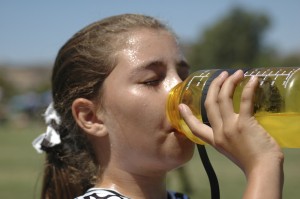
Heat exhaustion is not as serious as heat stroke, but it should not be ignored otherwise it can worsen into heat stroke. If your child has heat stroke they are at risk for permanent damage to vital organs, including the brain. Knowing the signs of heat sickness can help you protect your child from the potentially life threatening consequences associated with heat stroke.
What Is Heat Exhaustion?
There are two different types of heat exhaustion, water depletion and salt depletion. Water depletion includes excessive thirst, headache, weakness, and a loss of consciousness. Salt depletion includes nausea, dizziness and vomiting, as well as muscle cramps.
Heat sickness leads to heat stroke, which is a life-threatening condition directly related to becoming extremely overheated. The human body has a built-in temperature gauge that keeps the body at optimal temperature. When heat exhaustion sets in this function literally starts to shut down. This means your child’s internal temperature will continue to rise unless immediate action is taken to cool the body.
Babies and toddlers are the most susceptible to heat stroke, and should be watched very carefully whenever playing outdoors on a hot day. If your child is sunburned, not properly hydrated or is dressed in too warm of clothes, the risk for overheating increases.
Symptoms Of Heat Exhaustion
Since heat exhaustion is the first stage its symptoms tend to be milder.
Signs of heat exhaustion include:
- Thirsty
- Fatigue
- Leg cramps or stomach cramps
- Cool and moist skin
- Dark-colored urine (this is a sign of dehydration)
Read more on dehydration here
Symptoms Of Heat Stroke
If heat sickness is not treated it will turn into heat stroke, which is more serious and includes much more worrisome symptoms.
Signs of heat stroke include:
- Temperature of 103 degrees Fahrenheit or higher, but they are not sweating
- Skin is hot, red and dry
- Rapid pulse
- Restlessness or confusion
- Dizzy and/or has a headache
- Vomiting
- Shallow or rapid breaths
- Lethargic, not reacting to stimuli in a normal manner
- Unconsciousness and coma can occur in most serious cases that go untreated
What To Do If Your Child Is Showing Signs Of Heat Exhaustion
The moment your child is showing signs of heat sickness you want to relocate them to a cool, comfortable location and provide them with plenty of water. The goal is to cool down your child’s internal temperature, and you want to do so as quickly as possible.
- Bring your child indoors, preferably an air-conditioned space.
- Remove any unnecessary or tight clothing your child is wearing.
- Give your child cold liquids to drink, avoid sugary or overly cold beverages as these are known to cause stomach cramps.
- Give your child a cool bath or shower to help further cool them down. A cold compress can also help.
- Keep your child cool, and well hydrated for the rest of the day.
If your child does not start feeling better fairly soon you may need to visit your local Urgent Medical Center. If symptoms have worsened into signs of heat stroke you need to take your child to the emergency room.
What To Do If Your Child Is Showing Signs Of Heat Stroke
Heat stroke is incredibly serious and can quickly turn deadly, especially if a child reaches the point of unconsciousness. As soon as you recognize the signs of heat stroke you need to act as quickly as possible.
- Immediately remove your child from the sun
- Call 911
- Completely undress your child and relocate them to a flat surface in a cool room.
- While waiting for the ambulance to arrive you can apply a cool washcloth or sponge to your child’s skin. You may also fan them.
Related Topic: Sun Poisoning Blog
How To Help Prevent Dehydration And Heat Sickness In Children
A leading cause of heat sickness is dehydration; in fact, the two go hand-in-hand. Children don’t realize how thirsty they are until they have lost at least 2% of their body weight in water. Parents must always be on the lookout for how much water little ones are consuming. When your child is playing outdoors make sure they take plenty of breaks to stop, cool off, and drink water.
Dehydration accumulates over time, so if your child doesn’t drink enough water a few days in a row, they are getting more and more dehydrated and susceptible to heat sickness. Always monitor your child’s hydration to keep them happy, healthy and active!




